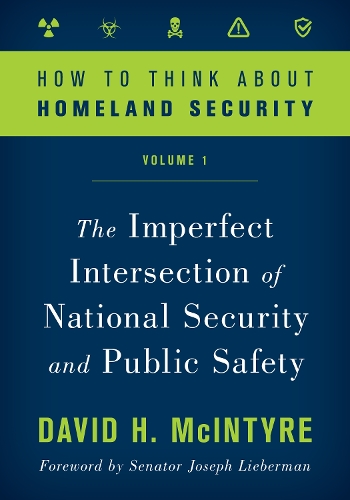
How to Think about Homeland Security: The Imperfect Intersection of National Security and Public Safety
(Paperback)
Available Formats
Publishing Details
How to Think about Homeland Security: The Imperfect Intersection of National Security and Public Safety
By (Author) David H. McIntyre
Bloomsbury Publishing PLC
Rowman & Littlefield Publishers
3rd May 2019
United States
Classifications
Tertiary Education
Non Fiction
Warfare and defence
363.340973
Physical Properties
Paperback
224
Width 177mm, Height 255mm, Spine 13mm
395g
Description
Volume 1:The Imperfect Intersection of National Security and Public Safetyexplains homeland security as a struggle to meet new national security threats with traditional public safety practitioners. It offers a new solution that reaches beyond training and equipment to change practitioner culture through education. This first volume represents a major new contribution to the literature by recognizing that homeland security is not based on theories of nuclear response or countering terrorism, but on making bureaucracy work.
The next evolution in improving homeland security is to analyze and evaluate various theories of bureaucratic change against the national-level catastrophic threats we are most likely to face. This synthesis provides the bridge between volume 1 (understanding homeland security) and the next in the series (understanding the risk and threats to domestic security). All four volumes could be used in an introductory course at the graduate or undergraduate level. Volumes 2 and 3 are most likely to be adopted in a risk management (RM) course which generally focus on threats, vulnerabilities, and consequences, while volume 4 will get picked up in courses on emergency management (EM).
Reviews
Though I am not the historian Dr. McIntyre is, I am well-versed in national strategy both academically and in actual execution. This book is the best distillation of the history, evolution, and practice of national strategy and its transition/application to homeland security that I have read. It should be required reading for every official in DHS, and every new recruit or hire into the organization. -- W. Michael Dunaway, University of Lousiana at Lafayette
This book provides great insights while remaining imminently readable. Having heard Dr. McIntyre speak on a number of occasions, I took pleasure in noting the preservation of his same conversational tone in his writing. A security practitioner for half of his adult life, what is occasionally described as pracademic attitudes enrich his teaching, and in this case, his writing. The book speaks to the reader, which--from another pracademic--is very deliberate praise. -- Bert B. Tussing, U.S. Army War College
You need to read this book now. Send it forward to policymakers, practitioners, and educators. This is a must-read for our profession. -- Steve Recca, Naval Postgraduate School
McIntyres How to Think About Homeland Security is an interesting and concise effort to embody the goal described in the title. The book is intended to help refineand redefinethe manner in which academics and practitioners view the underpinnings of homeland security. -- Tobias Gibson, Westminster College
Scholarly and compellingA great resource for policy examination, review, and citations -- John G. Comiskey, Monmouth University
Author Bio
Dr. David H. McIntyre has been writing, teaching, and presenting on National Security and Homeland Security issues for 30 years. He has taught for 20 semesters at the Bush School of Government and Public Service at Texas A&M University. Before that he was Deputy Director of the ANSER Institute for Homeland Security in Washington, DC (the first think tank focused on HS). Colonel McIntyre (USA, Retired) began those duties after a 30 year career in the United States Army, where he served in airborne and armored cavalry units, wrote and taught strategy and retired as the Dean of Faculty and Academics at the National War College.
